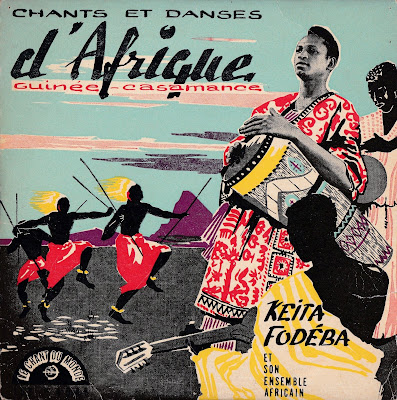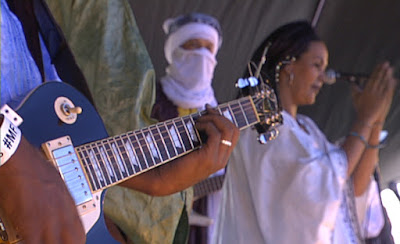This album I found a few weeks ago on a book fair, where in a corner they had some vinyl for real bargain prices. Mainly floppy pop, a lot of classical and some "other music", of course I was only interested in the latter and found this:
 |
| scan of the album I found at the fair |
Now I have to say, that I know [knew!] nothing of Surinam music, am hardly interested in music from South-America, but couldn't resist this one. Played it at home, like it a lot and delved into the behinds of this album, without any date on it anywhere. Also the label was strange to me as I know BASF only from empty tapes and K7s, they produced in the past, and chemicals they've done always. Anyway I found a lot of interesting info and let's start with a bio of the band leader.
Biography of Charles 'Eddy' Muringen
Charles 'Eddy' Muringen (1934.Jan.28 - 2009.Feb.18) grew up in Paramaribo, Surinam [former Dutch colony in South-America], as the youngest of a family of 7 children. At a very young age, when he was a boy scout, he opted for the musical genes.The trumpet became his first instrument, later he also learned to play the piano, guitar and vibraphone.
On 1956 March 01 Eddy entered the army, in which he would become one of the bandleaders ["Kapellmeister"] from 1975 till 1985, that make him one of the most important people in the music history of Suriname.
Some months later he married his girlfriend Thelma Henriette Burleson, their marriage is blessed with 7 children.
In 1969, he traveled as a trumpet player and one of the composers and arrangers to the [Militairy] Tattoo in Delft, the Netherlands. This musical spectacle causes many surprises with the audience because of the mixing of marching music with the Kaseko [musical genre from Suriname, a fusion of pop and folk styles from Europe, Africa and the Americas].
After this thunderous performance in Delft, Eddy immediately decided to use the opportunity to record an album, which will become legendary. In a studio in Heemstede, together with some members of the TRIS Chapel with which he is currently in the Netherlands, the LP 'Eddy Muringen and the Kamalamas" is recorded.
One of his most famous compositions on the album is 'We gwe ma we kon baka', which can still be heard on the radio, during concerts and at other occasions, almost 5 decades later. Another composition is 'Sinangoo', it is impossible to sit still when you hear its first tones.
Many believe that the songs on this LP can be considered belonging to the kaseko jazz genre and that it is the basis for this type of music. Musicians themselves are of the opinion that Eddy Muringen was the founder of the Kamalama style [instrumental kaseko] as we still know it today.
Later he was a member of many legendary groups like La Sonora Paramarera, Orchestra Tropical, Swing Masters, Cojunto Latinos, Popular Orchestra, Muringen Combo and Rodrigues Combo. He also gave music lessons to school teachers, many people still remember having received the solfège lessons from him.
In his 70s he is diagnosed with cancer, on 2009.Feb.18, just 2 weeks after his 75th birthday, he dies. At his funeral his children sing the stars from the sky. Suriname lost a great musician there, but his legacy is invaluable.
source: based on "The musical heritage of Charles 'Eddy' Muringen", in Dutch [translation]
Listen to Emelina Gerardina from the album
KAMALAMAS - Surinam Tropical Sound - led by Eddy Muringen [1969]
Kamalamas led by Eddy Muringen - Surinam Tropical Sound (Skratji Pokoe)
1969, LP, BASF #12-25478-6 [Holland/Surinam]
side A: a1.Sinango / a2.Emelina Gerardina / a3.Mina Mina / a4.Mi Brada / a5.Badji Kamalama / a6.Bosi Né Lowé //
side B: b1.Tintong / b2.Salm Kang / b3.Mé Gwé / b4.Sang Joe Dé Watji Mi / b5.Soekroe Finga / b6.Bari Na Doti
all songs traditionals arranged by Eddy Muringen and Alberto Gemerts
line-up: Eddy Muringen - piano / August Macintosch - trumpet / Carlo Jones - alt sax / Leo Knoppel - tenor sax / Albert Collins - drums / Johan Cederboom - skratji drong (percussion) / Ronald Esseboom - bass
Liner Notes [translation]:
Skratji Pokoe is one of the Surinam old rhythms. On this album Eddy Muringen and his Kamalama's give in a dignified way rebirth to this piece of Surinam culture, which is for the first time recorded for release on vinyl.
The hart of this music is the 'skratjidrong', which must be played in a special way, to reveal its characteristic rhythm. We have to be grateful to Eddy and his band, that with this LP, they have recorded for eternity this piece of traditional music from Surinam.
BASF wishes you many pleasant hours of dancing on the music of this album.
original liner notes in Dutch and Sranan Tongo [Surinam creole language] on backside of sleeve
About Kaseko - the music of Surinam
The slaves in Surinam brought with them their own music from West-Africa [Benin, Nigeria, Ghana, Senegambia]. After some time the various styles melted together with leading roles by the holy drums [Apinti] and the vocals. This music, called Winti, was in 6/8 time signature and finally got banned because of its ritual-religious character.
After the abolishment of slavery in the 19th century most former slaves awaited unemployment and they moved from the plantations to the towns at the coast. There they encountered various string instruments, which they integrated into their own musical style, developed in common 4/4 time signature, called Kawina.
In the 1930s the army, police and scouts started their own musical groups, chapels and marching bands, and recruited local musicians, who got introduced to wind instruments and learned to play marches. To earn some extra money, they also performed in their free time and started integrating the new instruments into their own music. This way did arise the typical Surinam music called Bigi Poka with improvisations on wind instruments.
A typical Bigi Poka orchestra consisted of tuba, banjo, snare drums, saxes, trumpets and the skratji-drong, a hand played base-drum with a cymbal on top. One by one newer instruments, like electric guitar and bass and drum kit were introduced and replaced some of the older ones. Also the style developed from improvisation into songs with lead vocals. At this point, in the 1960s, the music from these bands is called Kaseko.
source: article in 1980s music magazine [paper copy, I happened to start rereading this week]
The posted album is the only recorded instrumental Kaseko and considered a real classic in Surinam.
 |
| skratji-drong played live in the 1980s [source: 1980s music magazine] |
NEVER EVER FORGET:
"il faut me pardonner - you must forgive me"




















